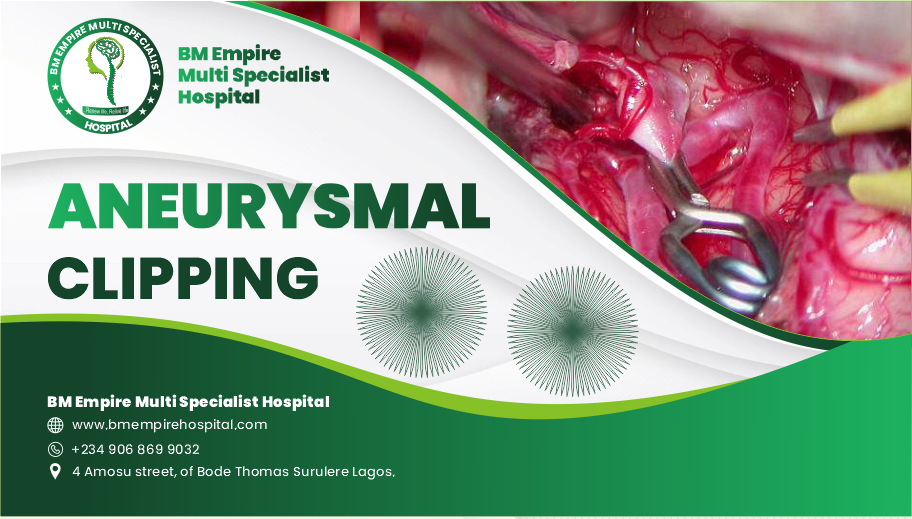Aneurysmal clipping is a critical neurosurgical procedure used to treat brain aneurysms, which can pose life-threatening risks if left untreated. This technique involves securing the aneurysm to prevent it from rupturing, thereby protecting brain function. In this blog post, we will discuss the causes of brain aneurysms, prevention strategies, the surgical procedure for aneurysmal clipping, and how to manage post-operative care. We will also highlight why BM Empire Multispecialist Hospital is the leading choice for neurosurgery in Lagos.
Causes of Brain Aneurysms
Brain aneurysms, or cerebral aneurysms, can develop for various reasons, including:
Genetic Predisposition: Family history and genetic conditions, such as Ehlers-Danlos syndrome or polycystic kidney disease, can increase the risk.
Hypertension: High blood pressure can weaken blood vessel walls, contributing to aneurysm formation.
Atherosclerosis: The buildup of fatty deposits in blood vessels can lead to vessel wall weakening and aneurysm development.
Smoking: Tobacco use is associated with an increased risk of aneurysms, as it contributes to vascular damage.
Age and Gender: Aneurysms are more common in adults, particularly in women aged 30 to 60.
Prevention of Brain Aneurysms
While not all brain aneurysms can be prevented, certain lifestyle choices and medical strategies can help reduce risk:
Control Blood Pressure: Regular monitoring and management of hypertension can significantly lower the risk.
Quit Smoking: Stopping tobacco use can improve vascular health and reduce the likelihood of aneurysm formation.
Healthy Diet: A balanced diet rich in fruits, vegetables, and whole grains can promote overall cardiovascular health.
Regular Exercise: Engaging in regular physical activity can help maintain a healthy weight and reduce blood pressure.
Routine Check-ups: Regular medical check-ups can aid in early detection of risk factors associated with aneurysms.
The Aneurysmal Clipping Procedure
Aneurysmal clipping is performed under general anesthesia and involves several steps:
Pre-operative Assessment: The neurosurgeon will conduct a comprehensive evaluation, including imaging studies (CT or MRI) to assess the aneurysm’s size, location, and shape.
Anesthesia: General anesthesia is administered to ensure the patient is unconscious and pain-free throughout the surgery.
Surgical Preparation: The surgical area is cleaned and sterilized to reduce the risk of infection.
Incision: The surgeon makes an incision in the scalp and removes a section of the skull (the cranium) to access the brain.
Aneurysm Identification: Once the brain is accessed, the surgeon identifies the aneurysm and carefully dissects surrounding tissue to expose it fully.
Clipping the Aneurysm: The surgeon places a small metal clip across the neck of the aneurysm, effectively sealing it off from the bloodstream and preventing future rupture.
Closure: After ensuring that the aneurysm is securely clipped, the surgeon replaces the section of the skull and closes the incision with sutures or staples. A dressing is applied to protect the site.
Post-operative Management
Proper aftercare is essential for recovery following aneurysmal clipping
Monitoring: Patients are closely monitored in the hospital for any signs of complications, such as bleeding, infection, or neurological changes.
Pain Management: Pain relief medications will be prescribed to help manage discomfort after surgery.
Neurological Assessments: Regular neurological evaluations will be conducted to ensure that the patient’s brain function is stable and recovering well.
Activity Restrictions: Patients are typically advised to avoid strenuous activities, heavy lifting, and driving for a specified period to allow healing.
Follow-up Appointments: Regular follow-up visits with the neurosurgeon are crucial to monitor recovery and assess the effectiveness of the clipping.
Signs of Complications: Patients should be vigilant for signs of complications, such as severe headache, changes in vision, or weakness, and seek immediate medical attention if these occur.
Why Choose BM Empire Multispecialist Hospital?
For those requiring treatment for brain aneurysms, BM Empire Multispecialist Hospital is the most preferred neurosurgery facility in Lagos. Located at 4, Amosu Street, Bode Thomas, Surulere, we offer:
Expert Care: Our highly skilled team of neurosurgeons utilizes advanced techniques and technology to provide optimal patient outcomes.
Comprehensive Services: We provide a wide range of neurosurgical treatments, ensuring all patient needs are met under one roof.
Patient-Centric Approach: We prioritize your comfort and education throughout your treatment journey, ensuring you are well-informed at every stage.
Conclusion
Aneurysmal clipping is a vital procedure for managing brain aneurysms and preventing potentially catastrophic outcomes. Understanding the causes, the surgical process, and the importance of aftercare can greatly enhance recovery. For expert neurosurgical care in Lagos, look no further than BM Empire Multispecialist Hospital. Chat Us on WhatsApp or call 09068699032

